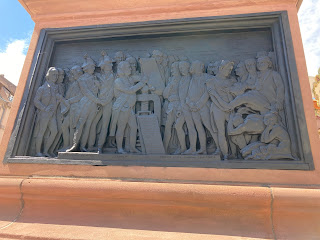Strasbourg, France, where I now live, is justly proud of Johannes Gutenberg (about 1406-1468), who invented the printing press. He was born in Mainz, nearby in what is now Germany, and returned to it later, but his crucial first steps in developing the printing press were taken in Strasbourg, where a statue and a plaza commemorate him.
One would think that Gutenberg’s idea for a printing press would have been a flash of insight that everyone would have immediately appreciated. But he did his initial work as a sideline and without funding from other people, as far as we know. His main work seems to have been as a goldsmith, polishing gems, and making mirrors. He got his idea for the printing press from another kind of press: the wine-press, which removed juice from grapes. Perhaps if he had just stuck to his polishing and mirrors, or had gone into the wine-press business, he might have had fewer financial setbacks. At least, the return on investment was very slow. His few major investors sued him. But, if Gutenberg had not persisted, the world would not have had what is now widely considered one of its most important inventions.
As a result of the printing press, ideas could now be publicized through a large number of copies, rather than copied by hand or by meticulous engravings that were affordable only for illustrations. Gutenberg developed an alloy of lead, tin, and antimony that could be melted and re-used. The greater number of copies allowed the written ideas to spread more widely and gain a recognition that they would not otherwise have had, or had only after a long delay.
Some examples of such ideas, themselves changing the course of history, are depicted on panels on the Gutenberg monument. One of them shows the signing of the American Declaration of Independence, with a Gutenberg press squarely and symbolically in the middle of the Continental Congress. Copies of the Declaration then spread around the world, where they stirred the ideas of liberty and democracy more than any handwritten document could have done.
Another example is the idea of emancipation of slaves and the end of the institution of slavery. Were it not for the printing press, relatively few people would have been aware of how cruel a system slavery was. Anti-slavery documents stirred the hearts of good people and embarrassed those who owned or profited from slavery. This plaque graphically depicts the cruelty of slavery.
Another example is education. The ideas and works of all kinds of intellectuals, from Descartes to Kant to Mozart to Milton to Newton, might have been lost had it not been for the printing press making their creations widely available. As the plaque shows, it was almost entirely white male creators who benefited from this, but the spread of knowledge was a process which, once started, could not be restrained.
Who knows what great ideas might be lost even today because, even if published, go unnoticed. How much worse it would be had there been no way to publish them.



